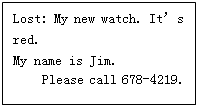题目内容




【小题1】Who (谁) lost a watch?
| A.Betty | B.Jim | C.Bruce | D.David |
| A.Yes, it is. | B.No, it isn’t . | C.Yes, this is | D.No, it is David’s. |
| A.Green. | B.White. | C.Black. | D.Red. |
| A.Betty | B.Jim | C.Bruce | D.David |
| A.678- 4219 | B.892- 0231 | C.708- 5209 | D.291-2084 |
【小题1】B
【小题2】B
【小题3】D
【小题4】D
【小题5】C
解析

 阅读快车系列答案
阅读快车系列答案We are a bilingual(双语) school for children of 6-15. We want a cook, a library assistant, a sports coach and a language teacher.
| Job | Age | Languages | Skill | Other terms (其它条件) |
| cook | 25~40 | Chinese | can cook Chinese and Western(西方) food | healthy |
| library assistant | 20~35 | Chinese, English | has the knowledge(知识) on all kinds of books | careful (仔细) |
| sports coach | 20~40 | Chinese, English | major in(主修) P.E. | healthy, strong |
| teacher | 30~45 | Chinese, English | major in English |  |
| A.A four-year-old child. | B.An eleven-year-old boy. |
| C.A sixteen-year-old girl | D.An eighteen-year-old kid. |
| A.A doctor. | B.An actor. | C.A library assistant | D.A waiter . |
| A.the sports coach | B.the cook |
| C.the library assistant | D.the language teacher |
| A.Chinese | B.English | C.food | D.P.E. |
| A.aged between 25 and 40 |
| B.who can cook Western food |
| C.who is careful and strong |
| D.who can speak English and Chinese |
Many years before the United States was founded(建立), Americans had already invented barbecues. But the first barbecues, in fact ,were the invention of the Taino Indians of Haiti, who dried their meat on raised frames(架子)of sticks over fires. Spanish explorers spelled the Taino word as barbacoa, and as time passed, English settlers along the Atlantic coat had their own barbecues.
One summer day in 1773, Benjamin Lynde, a citizen of Massachusetts, wrote in his diary, “Fair and hot ; Browne;hack overset.” That is , on a bright and hot day he went to the Brownes to attedn a barbecue, and his carriage(马车)fell over. It shows that the barbecue had its social occasion by that time. Large animals would be roasted whole on frames over hot fires, and neighbours would be invited to dinner.
In later centuries, as settlers moved to the west, the barbecue went along with it, reaching an especially large size in Texas, where a pit (坑)for fuels(燃料) such as tree branches might be over ten feet deep. Today , the barbecue grills(烧烤架)which are fueled by charcoal(木炭) or electricity are likely to be small and easy to move , and can cook only parts of an animal at a time, but people still have barbecues out of doors and always invite their neighbours or friends over.
【小题1】Who invented the barbecues first in history?
| A.American people. | B.Taino Indians. | C.Spanish explorers. | D.English settlers. |
| A.is only held on a hot sunny day | B.welcomes people who keep diaries |
| C.is held both indoors and outdoors | D.has its social occasion for over 200 years |
| A.社交功能 | B.社会福利 | C.社会地位 | D.社会背景 |
| A.drying meat on raised frames of sticks over fires |
| B.roasting a whole animal over a pit full of burning tree branches |
| C.cooking parts of animals over fires on grills fueled by charcoal |
| D.heating meat in the bright and hot daylight |
We go to school together by bike in the morning. We have lunch at school. After school in the afternoon, we often play sports. We play soccer and baseball. In the evening, he does his homework at home. Sometimes he watches soccer games on TV. On Sundays, he goes out with his parents in his father’s car. They play in the park and do sports there. Sometimes my father takes me there, too. We play sports together. We have a good time.
【小题1】Who is Frank? He is a _________.
| A.teacher | B.soccer player | C.student | D.driver |
| A.fourteen | B.thirteen | C.fifteen | D.sixteen |
| A.math and Chinese | B.English and Chinese |
| C.math and English | D.music and Chinese |
| A.has breakfast | B.has supper | C.has lunch | D.watches TV |
| A.In the evening | B.In the morning | C.In the afternoon | D.At noon. |
| A.Three | B.Four | C.Eight | D.Five |
| A.$ 11.50 | B.$ 10.50 | C.$ 12.50 | D.$12.00 |
| A.Coffee | B.Rice with chicken | C.Pizza | D.Salad |
| A.7:30 am | B.9:30 am | C.12:30 pm | D.10:30 pm |
| A.1517 | B.94709 | C.510 | D.5485525 |
One day Tom borrowed a pot(罐) from his neighbour, Ali. The next day he brought it back with another little pot inside.
“That’s not mine,” said Ali.
“Yes, it is.” said Tom, “While your pot was staying with me, it had a baby.”
Some time later, Tom asked Ali to lend him a pot again. Ali said yes, hoping that he would once again get two pots in return. However, days passed and Tom still did not give the pot back. Finally Ali was angry and went to ask for it.
“I am sorry,” said Tom, “I can’t give it back to you because it died.”
“Died!” cried Ali, “How can a pot die?”
“Well,” said Tom, “you believed me when I told you that your pot had a baby.”
【小题1】Who was the owner of the pot?
| A.Tom. | B.Tom and Ali. | C.The baby. | D.Ali. |
| A.Once. | B.Twice. | C.Three time. | D.Some times. |
| A.Because he wanted to get more. | B.Because he was a good neighbour. |
| C.Because he had lots of pots. | D.Because he likes to help others. |
| A.It died. | B.The neighbour took it back. |
| C.It was lost. . | D.Somebody else bought it from Tom. |
One day, a farmer was walking along a road with his son Thomas. The father said, "Look! There's a horseshoe. Pick it up and put it in your bag." Thomas said, 'It isn't worth the trouble." His father said nothing but picked it up himself. When they got to a nearby town, they lad a rest. There the farmer sold the horseshoe and with the few pennies he bought some cherries.
The father and the son continued their way. The sun was well up in the sky, and there wasn't a house or even a tree where they could have a rest. Thomas felt too thirsty to walk on. At this time, his father dropped a cherry on the ground and Thomas picked it up quickly and ate it. After a while, his father dropped another cherry and once again, his son lost some time in picking it up and putting it in his mouth.
And so they went on. The old farmer dropped the cherries and the son picked them up. When Thomas had eaten up all the cherries, his father said to him, "My dear son, if you had bent down earlier to pick up that horseshoe. it would not have been necessary for you to bend so many times for the cherries. Always remember the lesson that anyone who does not worry about the little things will find that he cannot do the great things.
【小题1】Who picked up the horseshoe at last?
| A.Thomas. |
| B.The old father. |
| C.Both the father and the son. |
| D.Neither the father nor the son. |
| A.some food |
| B.some water |
| C.some cherries |
| D.some pennies |
| A.felt very happy |
| B.didn't say anything |
| C.beat the son |
| D.became a little angry |
| A.he wanted his son to eat them all |
| B.he wanted his son to do more exercise |
| C.lie wanted to teach his son a lesson |
| D.he wanted his son to pick them up |
| A.cherries are so delicious that most of is like to eat-them |
| B.a horseshoe is so expensive that it can bring us a lot of money |
| C.if the boy wants to eat cherries, he must pick up the horseshoe |
| D.if we want to do some great things, we should start with some small ones |